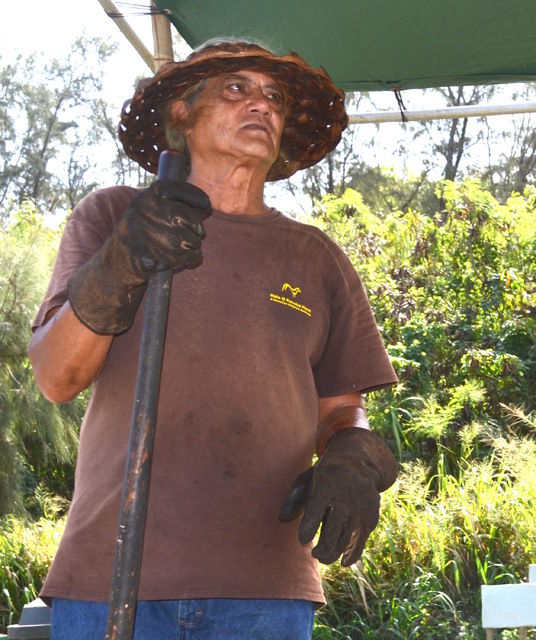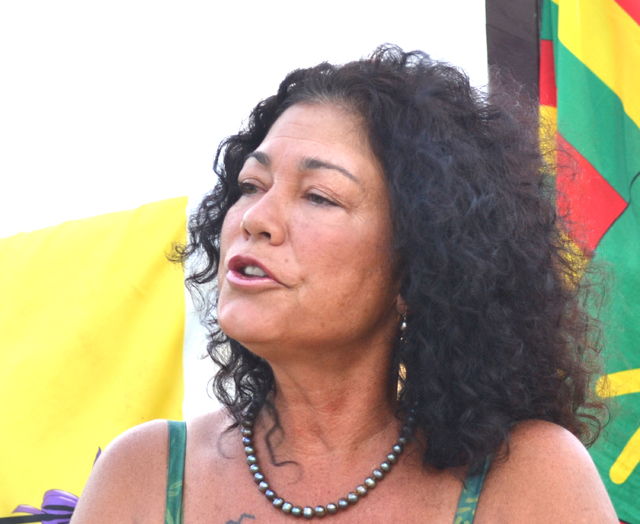LIHUE — Over 120 years have passed since a handful of businessmen with loyalties to the U.S. led a coup d’etat to overthrow the Kingdom of Hawaii, but some Native Hawaiians on the Garden Isle continue to advocate sovereignty.
“In reality, the U.S. recognized Hawaii back in 1875 when they signed the Treaty of Reciprocity with the Hawaiian Kingdom, recognizing her as a free and neutral and sovereign state,” said Hanalei resident Kaiulani Mahuka. “When you have people as determined as the Hawaiian people are to regain their sovereignty, anything and everything’s possible.”
Claiming Hawaiian national lands is top priority for the people of the Hawaiian government, said Keohokui Kauihana, a noble representing Kauai in the Hawaiian Government Legislature.
“There will be future exercises to be done to claim the lands,” Kauihana said. “We’re trying to establish our jurisdictions back. The public will begin to understand that the state has no jurisdiction.”
Others, however, believe sovereignty will never be regained.
“The opportunity to maintain the sovereignty of the Hawaiian people really ended with the abdication of Liliuokalani from the throne,” said Bill Fernandez, local author and former president of the Kauai Historical Society. “I’m not saying it’s right, but the takeover by Hawaii by the plantation interests was somewhat manufactured by the U.S.”
Whether it was America, Germany or Japan, Fernandez maintains that it was inevitable a great power was going to grasp Hawaii.
“We go through periods of time of rising Hawaiian leaders … but outside of armed revolt, nothing like independence will occur,” he said.
Kaneohe resident Ken Conklin, who moved to Hawaii in 1992, agreed.
“Hawaii should remain unified with the United States of America,” said Conklin, author of “Hawaiian Apartheid — Racial Separatism and Ethnic Nationalism in the Aloha State.” “All of the people should remain united under the single undivided sovereignty of the state of Hawaii.”
Conklin said Hawaiian sovereignty is a complicated issue. It starts with small steps, he said.
“The big concept is unity and equality,” he said. “We’re all equal. We all should be treated equally. We should maintain our unity with the U.S. and each other.”
The state of Hawaii is trying to be a sovereign state power, but it doesn’t have the qualifications, Kauihana said.
“The state of Hawaii is in international violation, so everybody has to know that,” he said. “You can’t just make up authority. What they’re doing is blocking their sovereignty with their rules and regulations.”
Conklin would rather see the “nasty politics” between the advocates of sovereignty and supporters of the U.S. than violence.
“Politics may be nasty, but it’s not as nasty as an upright war,” he said. “If there hadn’t been an overthrow, where would we be now? Maybe we would be a part of Japan.”
‘We grew up in a lie’
Though the United States recognized Hawaii as a sovereign nation in 1875 with the Treaty of Reciprocity, its military consisting of 162 armed troops joined a group of Hawaii businessmen led by Lorrin Thurston — a lawyer and grandson of American missionaries to Hawaii — marched past Iolani Palace on Jan. 5, 1893.
Under pressure from Thurston and the group of American loyalists, and to avoid any act of bloodshed, Queen Lili‘uokalani surrendered Hawaii’s sovereignty 12 days later.
“I, Lili‘uokalani, by the grace of God and under the constitution of the Hawaiian Kingdom, Queen, do hereby solemnly protest against any and all acts done against myself and the constitutional government of the Hawaiian Kingdom by certain persons claiming to have established a Provisional Government of and for this Kingdom,” she said on Jan. 17, 1893.
The queen believed the U.S. would eventually restore the Hawaiian Kingdom, but the U.S. would later annex Hawaii through a joint resolution which led the islands into statehood in the summer of 1959.
Kauihana said the Hawaiian Kingdom should bring more evidence of the suppression of Hawaiian sovereignty to light.
“I’ve grown up living a fraud all these years. We grew up in a lie. We have to identify it as war crimes,” he said. “It was illegal to the max, and the U.S. knows it, too.”
Hawaii did have a chance for sovereignty during World War II, Fernandez said.
“One of the tenets of United Nation’s creation was colonized people would have an opportunity to regain their independence,” he said. “Because the UN had a resolution that was coming in 1960, it required all signatories in the UN to go through this process of allowing colonized people to go through this independence.”
But that changed in 1959.
“Once Hawaii became a state, it became an exception to the UN resolution,” he said.
American history has portrayed the overthrow to be a rescuing of the Hawaiian Kingdom by the United States, Mahuka said.
“They created the illusion that Hawaii at the time was a country that needed to be rescued,” she said. “In reality at the time of the overthrow, Hawaii was the richest nation in the planet with a 98 percent literacy rate with her people.”
In 1993, President Bill Clinton issued the Apology Resolution that “acknowledges that the overthrow of the Kingdom of Hawaii occurred with the active participation of agents and citizens of the United States.”
It also acknowledges the Hawaiian people did not relinquish their claims to sovereignty to the United States.
It was then, almost 25 years ago, when Mahuka was awakened.
“Our queen never excluded any race, ethnicity. She would never allow her people to sleep in the streets,” Mahuka said. “In order for any of our legacies to be continued in truth, America has to do the right thing and de-occupy our country. They have to follow through and do the right thing.”







I feel horrible that the US annexed Hawaii against the Hawainpeoiple wishes and interests.
I can see nothing to do to help them.